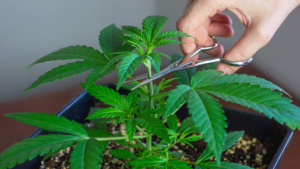In groundbreaking research, scientists from the University of East Anglia (UEA) have discovered the genes responsible for producing a novel anti-stress molecule in plants, called dimethylsulfoniopropionate (DMSP). This molecule plays a key role in helping plants thrive in challenging environments, such as coastal areas with high salt levels. The study highlights that while many plants make DMSP, those that produce higher levels, like Spartina saltmarsh grass, are better equipped to grow under stress. Understanding how plants naturally create this compound opens new avenues for boosting crop resilience in the face of global climate change.

New Insights on Stress Tolerance in Plants
The research reveals that DMSP can be used to improve plant growth under stressful conditions, such as drought or poor soil quality. By either supplementing plants with DMSP or engineering plants to produce more of it, scientists can enhance the tolerance of crops to extreme environments. This discovery is particularly important for sustainable agriculture, as it could help plants grow in nitrogen-poor soils and contribute to improved food security in a changing climate.
Global Impact of DMSP on Climate and Agriculture
DMSP is not only beneficial for plant stress protection but also plays a crucial role in global carbon and sulfur cycles. Its breakdown by microbes produces dimethylsulfide, a climate-cooling gas. The study, published in Nature Communications, emphasizes the significance of Spartina cordgrass, a high DMSP-producing plant, in coastal ecosystems that act as hotspots for DMSP production. This breakthrough has the potential to revolutionize crop management, making agriculture more resilient to environmental stress while contributing to climate regulation.
For further information, visit: https://www.bing.com/
Read our previous articles: https://scitechupdate.com/index.php/researchers-develop-biocomputer-by-linking-16-brain-like-structures-grown-from-human-cells/
https://scitechupdate.com/index.php/breakthrough-material-nasas-grx-810-could-change-everything
Breakthrough Material: NASA’s GRX-810 Could Change Everything
https://scitechupdate.com/index.php/scientists-synthesize-diamonds-in-just-15-minutes
https://scitechupdate.com/index.php/researchers-notify-of-u-s-groundwater-depletion-by-2050
https://scitechupdate.com/index.php/big-achievement-first-ever-capture-of-x-ray-image-of-single-atom
https://scitechupdate.com/index.php/china-is-generating-heat-waves-across-the-pacific-ocean
https://scitechupdate.com/index.php/super-material-could-have-more-potential-than-graphene
https://scitechupdate.com/index.php/first-5g-enabled-surgery-performed-by-doctor
https://scitechupdate.com/index.php/two-new-covid-variants-called-flirt-in-the-united-states
First 5G-enabled Surgery performed by Doctor (scitechupdate.com)
Hitchhiking Aliens: New Research into Panspermia (scitechupdate.com)
